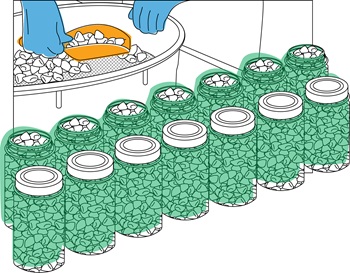Quality Program
Bring Your Food Safety Program to the Next Level With the SQF Quality Program
The SQF Quality Code gives leaders a framework to reduce variation, strengthen customer trust, and make quality a competitive advantage. Pursuing SQF Quality certification signals that your operation is not only safe, but built for performance.
Achieving SQF Quality certification benefits your customers and your company by:
- Helping with food production conformance
- Creating food safety consistency
- Reducing operational costs and waste
- Allowing you to showcase the quality shield on your food packaging

Why Add the SQF Quality Code
Adding SQF Quality certification can help your site stand out to buyers, brand partners, and retailers who demand consistent, measurable food safety performance. The SQF Quality program is designed for sites that want to go beyond food safety, to implement risk reduction systems that monitor, control, and improve product quality over time. It provides a structured way to identify and correct quality threats before they become costly problems.
Companies pursuing SQF Quality often report:
- Increased customer confidence in quality management and repeat business
- Lower operating costs through reduced rework and waste
- More consistent products that strengthen brand loyalty
- Developing a proactive decision-making process that creates a more consistent output
- A reduction in withdrawals, recalls, and waste
Who's Eligible
If your site already holds a GFSI-benchmarked food safety certification or an equivalent, such as HACCP or ISO 22000:2018, you’re eligible to add the SQF Quality Code.
Eligible operations include Primary Production, Manufacturing, Packaging, and Distribution.
The cost is $250 and is available when you are audited through your certification body's audit process. SQF-certified sites adding a quality certification only pay a $150 fee.
The Benefits of the Quality Code
Implementing a food quality system begins with what you already have in place. Start with your food safety foundation, then layer in quality controls that support measurable outcomes. The Quality Code applies a risk-based method to identify and control quality threats, and includes process controls to monitor product quality, identify deviations from control parameters, and define the corrections necessary to keep processes under control.
By following the SQF Quality Code, your business can:
- Use a risk-based approach (similar to HACCP) to identify and control quality hazards
- Monitor key process parameters to detect deviations early
- Reduce production waste, consumer complaints, and returns
- Build a culture that values continuous improvement
The results, a stronger reputation, tighter operations, and fewer surprises on the production floor.
Getting Started

If you are ready to add the Quality Code, it is a straightforward process.
Contact your Certification Body. If your Certification Body is SQF-licensed, they can guide you.
Download the SQF Quality Code. Access the latest Edition in our Code library.
Plan and implement. Align your systems for process control and continuous improvement.
Set yourself up for success by taking our popular training course on Implementing the SQF Quality Code.

